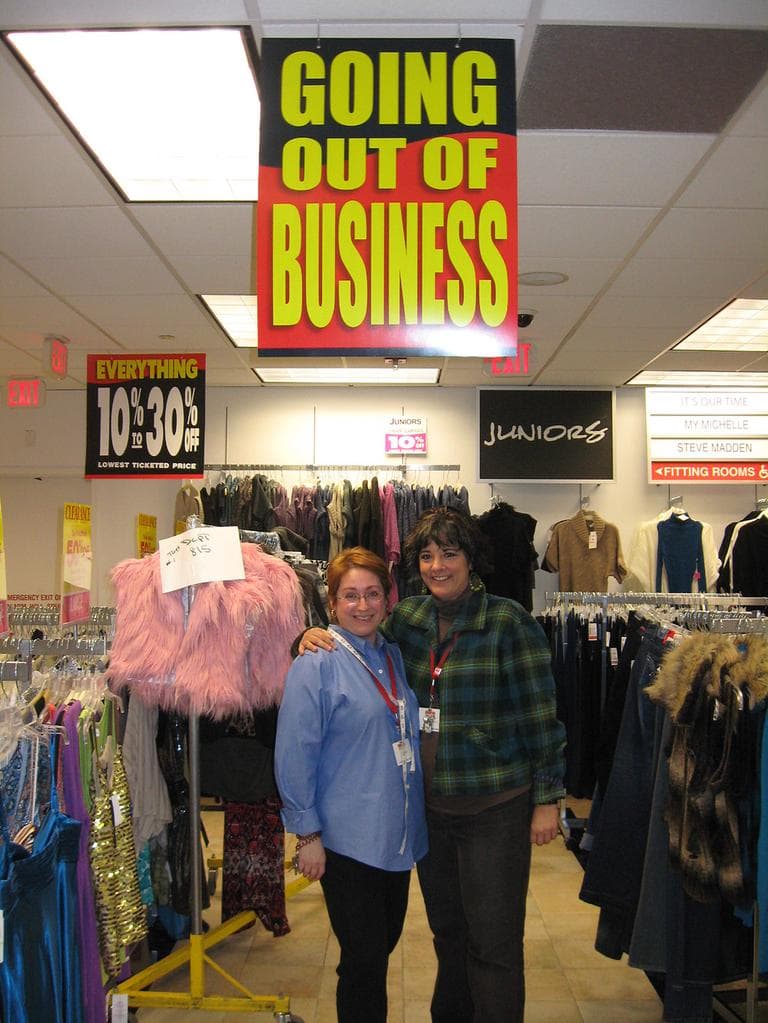Advertisement
Memories Of The Original Filene's Basement, Rats And All
ResumeThis holiday season is the final one to pick up bargains at Filene's Basement. The chain's owner has declared bankruptcy and expects to liquidate all its remaining stores by the end of next month.
That will bring down the curtain on a singular retail institution that got its start in Boston in 1909. But for many people, including longtime employee Tracy Ruiz, the brand faded into the history books when the original Filene's Basement closed in 2007.

"You didn't experience the Basement unless you were in the downtown store," says Ruiz, who now works at the store in the Back Bay but spent most of her 25-year career at the basement Basement — the underground one in Downtown Crossing. "These other outlets, these stores here, they're not the true Filene's Basement."
There was no other retail experience like it. The bins heaped with piles of clothes. The shoppers in such a frenzy that they ignored the dressing room and stripped right in the aisles.
"No one used a fitting room. You saw everything," said Lori Frongillo, who has worked for Filene's Basement for 17 years and, like Ruiz, transferred to the Boylston Street store when the Downtown Crossing location closed.
"They did not care. It was the thing to do. They're not gonna wait in that line," Frongillo said. "They're gonna see it — they're putting it on. They don't care. They're in the Basement. That was their whole thing."
The Filene's Basement on Washington Street had such a devoted following that some people who worked downtown went there every single lunch hour.
"Absolutely — every day," Frongillo recalls. "We'd be like, 'Why don't you work here? You're here as much as I am!' Every day and every night at 5 after they got off work because they'd be watching that one item, waiting for it to go down again."
She's referring to the automatic markdown policy, which made shopping there a game of strategy. Anything that hadn't sold after two weeks dropped in price by 25 percent, after three weeks by 50 percent and after four weeks by 75 percent. After that, it went to charity. So shoppers held off buying certain things in hopes that the price would drop.
Then, if they came back and couldn't find it, "they'd be horrified when it was gone," Frongillo says, recalling that many customers tried to hide merchandise to prevent other shoppers from finding and buying it.
Other customers wanted their items immediately. They'd actually fight over them.
"The ultimate bargain dress event probably had to be the most vicious, when every dress, we'd get thousands of them for $16.99," Frongillo says. "And they would just grab. They'd grab them out of your arms. 'I had it!' 'No, I had it!' "
Shoppers sometimes lost articles of clothing they'd been wearing, or lost shoes, because they'd be swiped or misplaced in the scrum of a particularly energetic shopping moment.
Ruiz and Frongillo remember how Basement shoppers got high off the joy of retail victories.
"I think it was just the thrill of knowing that you're going to get, you know, a Ralph Lauren shirt for 10 bucks," says Frongillo.
Adds Ruiz: "We were selling it for $20; you wait a couple of weeks and it goes down by 50 percent it's just being able to say, 'I only paid $10 for this.' "
Asked to name the best buy she ever got, Frongillo had this reply: "It cost you a fortune to work there, put it that way, because you'd be buying things just because it was unbelievable. It was like, oh my God — this went to fifty off? I have to have this [even if] I don't need it!"
Rats And All
There were, however, some unique downsides to working at the original Filene's Basement.
"We had a 'Code 51' and if you heard that [it meant] there was water rushing in somewhere or the ceiling gave way," Frongillo recalls.
There were also rats. And roaches. And occasional broken pipes.
"It was an old, old building," Frongillo explains. "They took a wall down once and behind the wall were all dead critters. It was nasty."
"There's been times where and this happened more than once that a rat has given birth on our tables," Ruiz adds. "And somebody would tell us and we'd be like, 'Oh my God!' "
"Go home and wash your stuff first!" Frongillo adds.
But soon, no more. The 20 or so stores left in the region are now clearing out their merchandise for good for as much as 80 percent off — although many shoppers said their final goodbyes when the basement Basement closed its doors four years ago.
This program aired on December 16, 2011.
